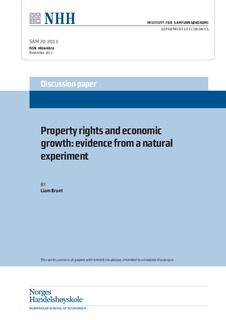| dc.contributor.author | Brunt, Liam | |
| dc.date.accessioned | 2012-03-13T12:25:14Z | |
| dc.date.available | 2012-03-13T12:25:14Z | |
| dc.date.issued | 2011-11 | |
| dc.identifier.issn | 0804-6824 | |
| dc.identifier.uri | http://hdl.handle.net/11250/163362 | |
| dc.description.abstract | In 1795 the British took control of the Cape colony (South Africa) from the Dutch; and in
1843 they exogenously changed the legal basis of landholding, giving more secure
property rights to landholders. Since endowments and other factors were held constant,
these changes offer clean tests of the effects on economic growth of colonial identity and
secure property rights. The effects of both changes were immediate, positive and large.
Other legal and institutional changes, such as the move to a common law system in 1827,
had no such effects on economic growth. | no_NO |
| dc.language.iso | eng | no_NO |
| dc.publisher | Norwegian School of Economics, Department of Economics | no_NO |
| dc.relation.ispartofseries | Discussion Papers;20/2011 | |
| dc.subject | economic growth | no_NO |
| dc.subject | legal origins | no_NO |
| dc.subject | property rights | no_NO |
| dc.title | Property rights and economic growth: evidence from a natural experiment | no_NO |
| dc.type | Working paper | no_NO |
| dc.subject.nsi | VDP::Social science: 200::Economics: 210::Economics: 212 | no_NO |
